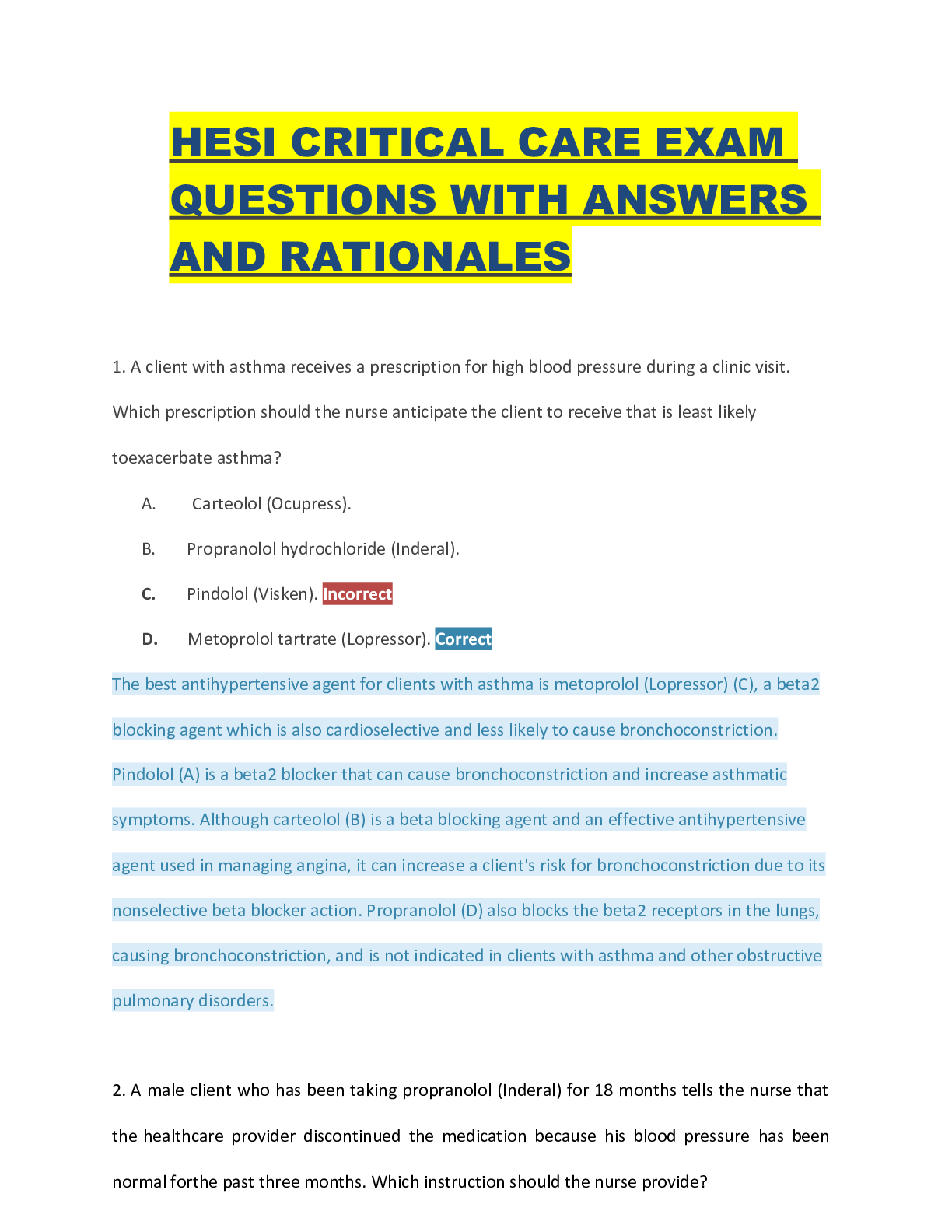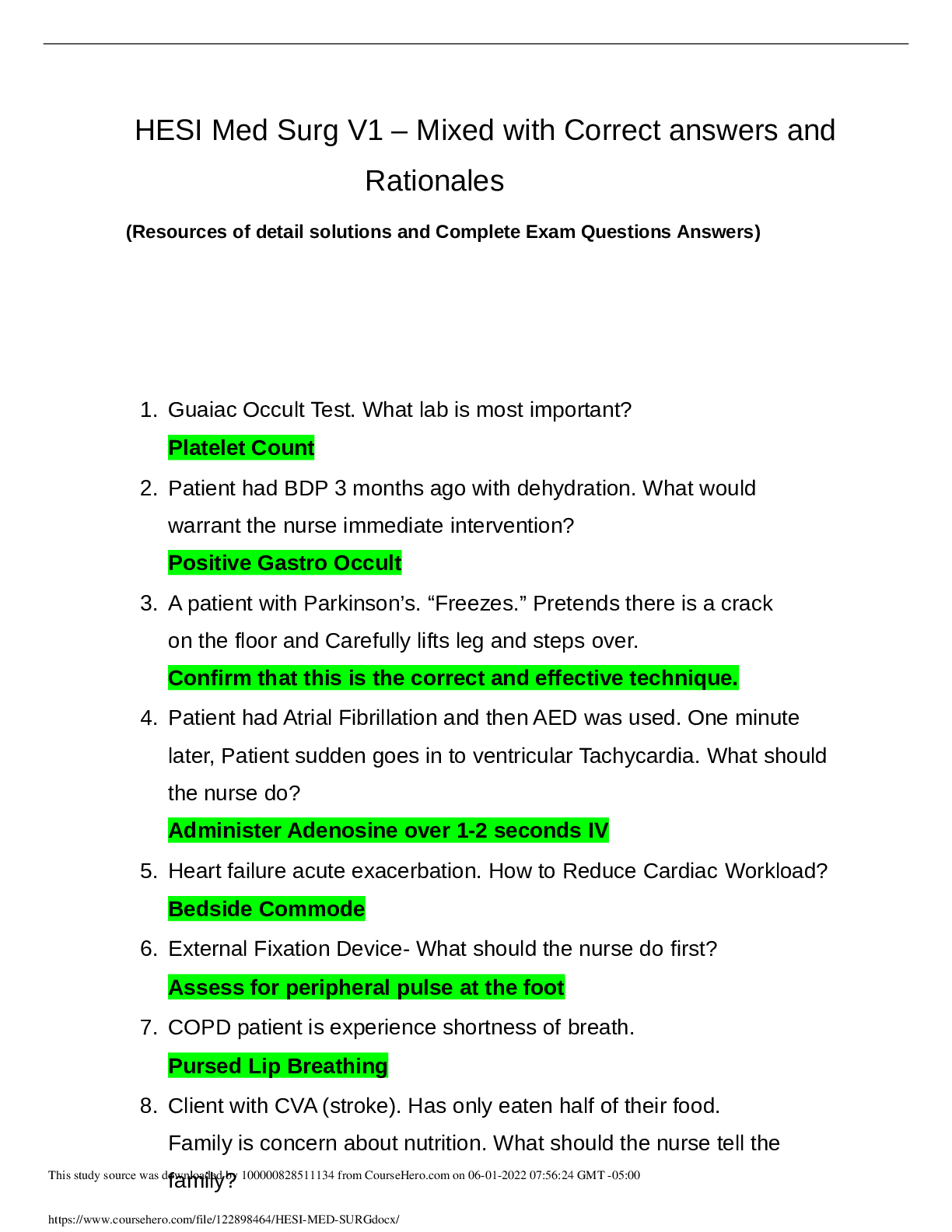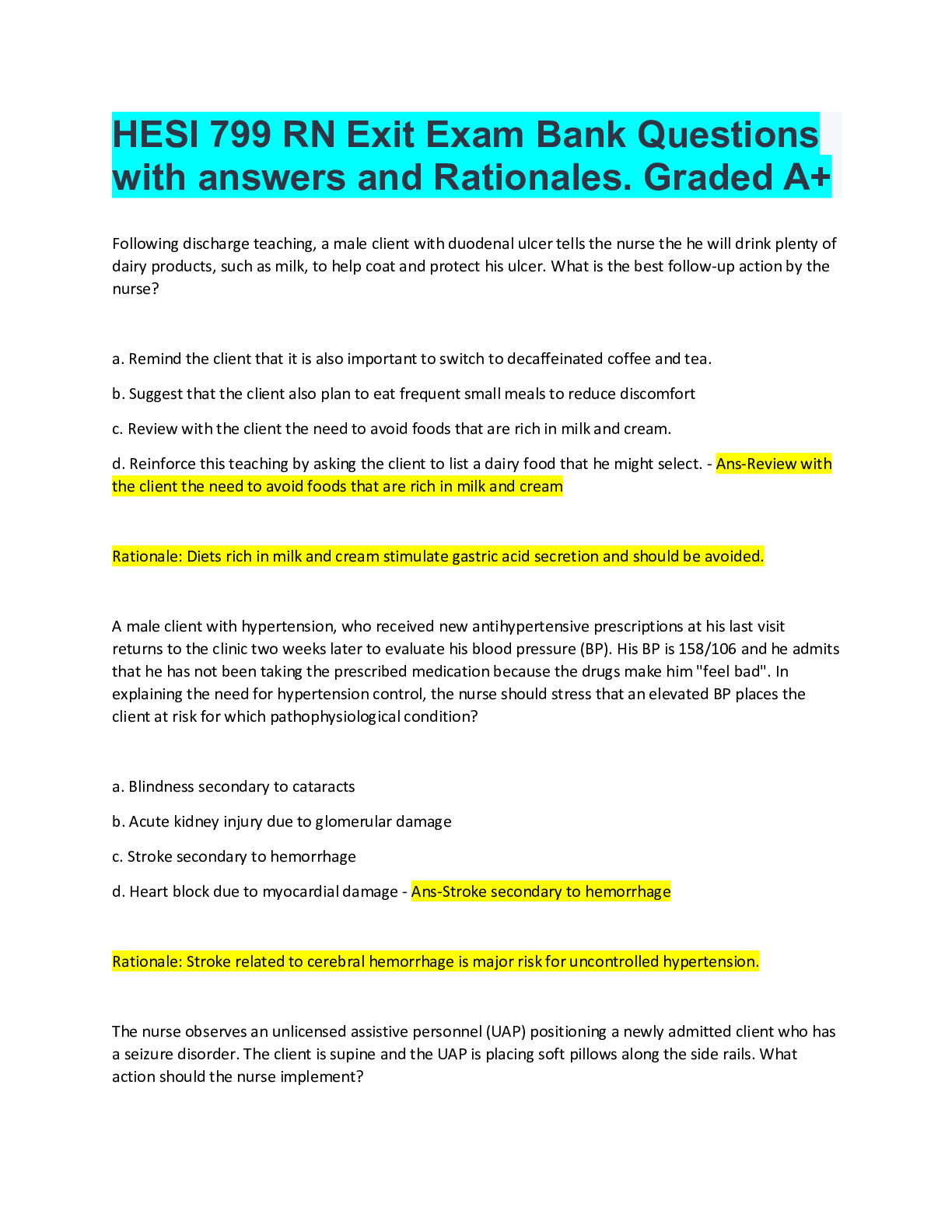HESI Comprehensive Exam - Questions, Answers and Rationales
Document Content and Description Below
HESI Comprehensive Exam - Questions, Answers and Rationales A female client admitted to the mental health unit tells the nurse that she cannot leave the house without checking to be sure that she ha... s shut off the coffee maker and unplugged her curling iron. The client states that she even leaves the house, gets into her car, and then has to go back into the house to check these appliances again and that these behaviors are interfering with her work and social commitments. Which anxiety disorder does the nurse associate this client's symptoms? Agoraphobia Avoidant personality disorder Obsessive-compulsive disorder Dependent personality disorder Rationale: Obsessive-compulsive disorder is an anxiety disorder characterized by intrusive thoughts that produce uneasiness, apprehension, fear, or worry; by repetitive behaviors aimed at reducing anxiety; or by a combination of such thoughts (obsessions) and behaviors (compulsions). The client is inflexible and rigid, and is highly critical of self and others. The characteristics of dependent personality disorder include neediness and self-sacrificing and submissive behaviors. The client with avoidant personality disorder is extremely shy, feels inadequate, and is sensitive to rejection. Agoraphobia is the fear of open spaces. A nurse is developing a plan of care for a client admitted to the nursing unit with a diagnosis of paranoid personality disorder. On which characteristic of the disorder does the nurse base the plan of care? Inflexible and rigid Self-sacrificing and submissive Highly critical of self and others Projecting blame, possibly becoming hostile Rationale: A client with paranoid personality disorder projects blame, is suspicious of others, and may become hostile or violent. The client also experiences cognitive or perceptual distortions. A client who is inflexible and rigid and is highly critical of self and others is showing signs/symptoms of obsessive-compulsive disorder. Being self-sacrificing and submissive is a characteristic of a client with dependent personality disorder. A client on the mental health unit says to the nurse, "Everything is contaminated." The client scrubs his/her hands if forced to touch any object. While planning care, what does the nurse remember about compulsive behavior? Temporarily eases anxiety in the client Is an attempt on the client's part to punish self Is an attempt on the client's part to seek the attention of others Is a response by the client to voices saying that everything is contaminated and that he/she must engage in this behavior Rationale: Compulsions are ritualistic behaviors that an individual feels driven to perform in an attempt to reduce anxiety. Obsessions are thoughts, impulses, or images that persist and recur so that they cannot be dismissed from the mind. The other options identify interpretations of the client's obsessive behavior. A male client arrives at the emergency department and reports to the nurse, "I woke up this morning and couldn't move my arms." He also tells the nurse that he works in a factory and witnessed an accident 3 weeks ago in which a fellow employee's hands were severed by a machine. What is the priority response by the nurse? Assessing the client for organic causes of loss of arm movement Calling the crisis intervention team and asking them to assess the client Performing active and passive range-of-motion (ROM) exercises of the client's arms Asking the client to move his arms and documenting the loss of movement he has experienced Rationale: The priority is assessing the client for organic causes of loss of arm movement and ruling out any neurological disorders. After it has been determined that there is no physiological basis for the problem, further psychiatric evaluation can be done. Encouraging the client to move his arms and performing active and passive ROM exercises have no beneficial effect in this situation. In fact, either option could be harmful if there is a physiological basis for the client's problem. A nurse is assigned to conduct an admission assessment of a client with a diagnosis of bipolar disorder. What does the nurse plan to do first? Perform the physical assessment Tell the client about the nursing unit rules Establish a trusting nurse-client relationship Tell the client that he/she will have to participate in self-care Rationale: Bipolar disorder, also known as manic-depressive illness, is a brain disorder that causes unusual shifts in mood, energy, activity levels, and the ability to carry out day-to-day tasks. The nurse should first develop a trusting relationship with the client. It is most important to establish a trusting relationship, which will indicate to the client that the client is important. After a therapeutic relationship has been established, other interventions may be carried out. The nurse would perform a physical assessment, but this would not be the first intervention. The client should be informed of the nursing unit's rules, but, again, this is not the first intervention. Telling the client that he/she will have to participate in self-care is inappropriate. The client with bipolar disorder requiring hospitalization is likely to need assistance with care. A client arrives in the emergency department and tells the nurse that he/she is experiencing tingling in both hands and is unable to move his/her fingers. The client states that he/she has been unable to work because of the problem. During the psychosocial assessment, the client reports that 2 days earlier his/her partner said he/she wanted a separation and that he/she would have to support self financially. What problem does the nurse conclude that this client is exhibiting signs/symptoms compatible with? Severe anxiety Conversion disorder Posttraumatic stress disorder (PTSD) Obsessive-compulsive disorder Rationale: Conversion disorder is characterized by the presence of one or more signs/symptoms suggesting a neurological problem that cannot be attributed to a medical disorder. Psychological factors such as stress and conflict are associated with the onset or exacerbation of the sign/symptom. A person with severe anxiety may focus on a particular detail or many scattered details. The person may have difficulty noticing what is going on in the environment, even when it is pointed out by another. Learning and problem-solving are not possible at this level of anxiety, and the client may be dazed and confused. PTSD is characterized by repeated re-experiencing of a highly traumatic event that involved actual or threatened death or serious injury to self or others to which the individual responded with intense fear, helplessness, or horror. Obsessions are thoughts, impulses, or images that persist and recur so that they cannot be dismissed from the mind. Compulsions are ritualistic behaviors that an individual feels driven to perform in an attempt to reduce anxiety. A client experiencing delusions says to the nurse, "I am the only one who can save the world from all of the terrorists." What is the appropriate response by the nurse? "Tell me your plan for saving the world." "Why do you think that you can accomplish this by yourself?" "I don't think anyone can save the world from the terrorists by himself/herself." "You must be powerful. Do you really believe that you can do this by yourself?" Rationale: The appropriate response by the nurse is "I don't think anyone can save the world from the terrorists by himself/herself." The nurse should not go along with or reinforce the client's delusion. The nurse should respond to the client by presenting reality. "Tell me your plan for saving the world," "Why do you think that you can accomplish this by yourself?" and "You must be powerful. Do you really believe you can do this by yourself?" all reinforce the delusion and encourage further conversation about it. A client diagnosed with adenocarcinoma of the ovary is scheduled to undergo chemotherapy with cyclophosphamide after total abdominal hysterectomy with bilateral salpingo-oophorectomy. What does the nurse instruct the client to do during chemotherapy? Select all that apply. Eat foods that are low in fat and protein Obtain pneumococcal and influenza vaccines Drink copious amounts of fluid and void frequently Avoid contact with any individual who has signs/symptoms of a cold Avoid contact with all individuals other than immediate family members Rationale: Hemorrhagic cystitis is an adverse effect of this medication. The client is encouraged to drink copious amounts of fluid at least 24 hours before, during, and after chemotherapy, and avoid contact with individuals who are ill, have a cold, or have recently received a live-virus vaccine. The client is also encouraged to void frequently to prevent cystitis. The client is not to receive immunizations without the primary health care provider's approval, because they could diminish the body's resistance, putting the client at increased risk for infection. It is not necessary for the client to avoid contact with all individuals other than immediate family members. The client should, however, avoid contact with individuals who are ill, have a cold, or have recently received a live-virus vaccine. Encouraging adequate dietary intake is appropriate, but a low-protein or low-fat diet is not necessary. The client who is scheduled to undergo chemotherapy asks the nurse, "Is my hair going to fall out?" What does the nurse tell the client? Her hair will definitely fall out She should not be worrying about her hair at this point Her hair may fall out but will regrow after the chemotherapy is discontinued Vigorous hair-brushing is important while the client is undergoing chemotherapy to prevent hair loss Rationale: Some chemotherapeutic agents cause hair loss, and the client should be informed of this possibility. The client should also be reassured that chemotherapy-related hair loss is temporary and that the hair will regrow after the chemotherapy is discontinued, perhaps in a different shade, color, or texture. Telling the client that her hair will definitely fall out is incorrect and telling her that she should not be worrying about her hair at this point ignores the client's concern. Hair dyes, permanents, and vigorous hair-brushing are avoided to minimize thinning. A nurse has given a client with viral hepatitis instructions about home care. Which statement by the client indicates to the nurse that the client needs further teaching? "I can't drink alcohol." "I have to avoid having sex until the test for antibodies comes back negative." "I need to rest a lot during the day and get enough sleep at night." "I need to eat three meals a day with foods high in protein, fat, and carbs." Rationale: The client needs further teaching if the client states, "I need to eat three meals a day with foods high in protein, fat, and carbs." The client with viral hepatitis should consume a high-carbohydrate, low-fat diet, not a diet high in fat. The client should avoid hepatotoxic substances such as alcohol. Sexual intercourse is avoided until antibody testing results are negative. The client with hepatitis is easily fatigued and may require several weeks to reach his or her former activity level. It is important for the client to get adequate rest both during the day and at night so that the liver may heal. A nurse provides home care instructions to a client who has undergone fluorescein angiography. What comment by the client helps the nurse determine that the client needs further instruction? [Show More]
Last updated: 5 months ago
Preview 1 out of 101 pages
Instant download
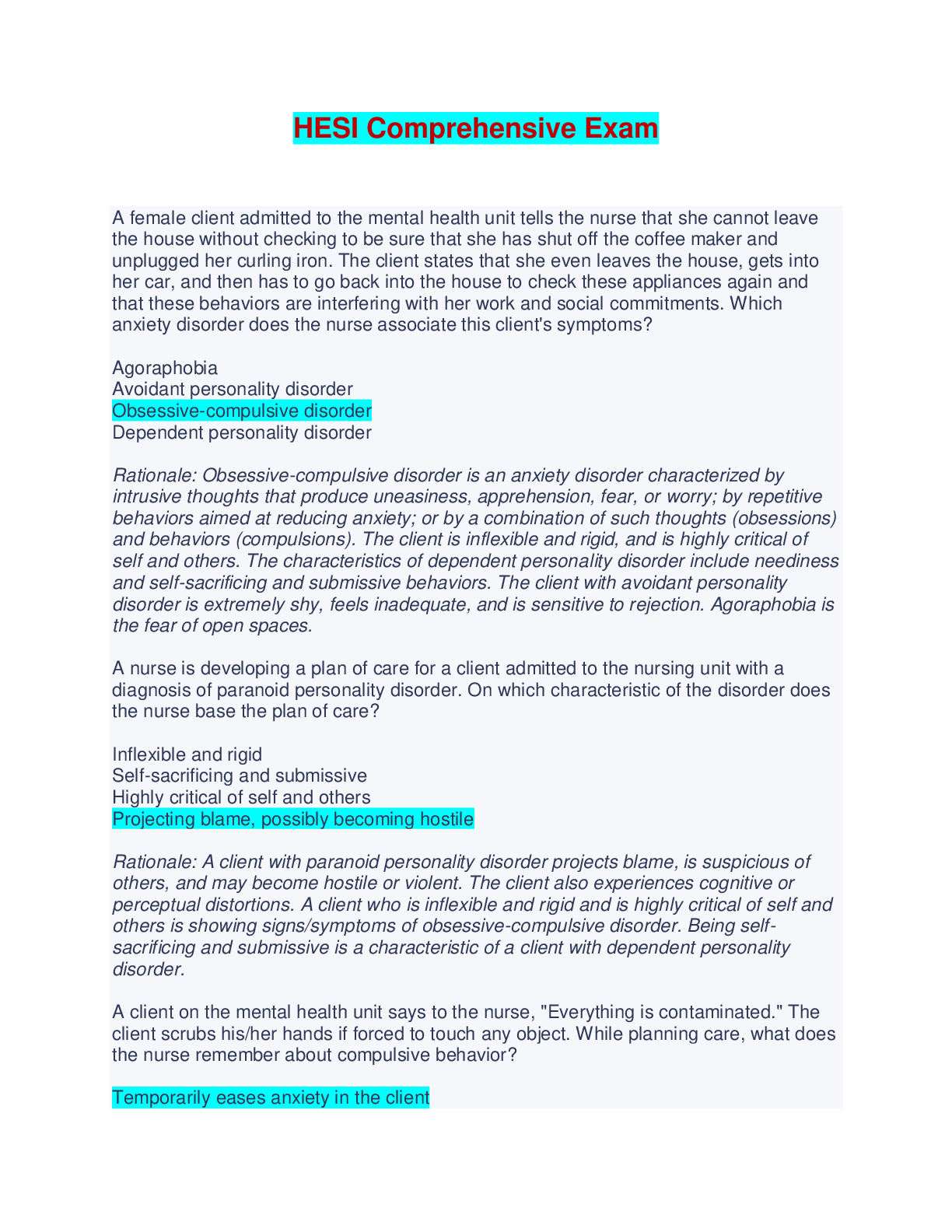
Buy this document to get the full access instantly
Instant Download Access after purchase
Add to cartInstant download
Reviews( 0 )
Document information
Connected school, study & course
About the document
Uploaded On
Jan 03, 2024
Number of pages
101
Written in
Additional information
This document has been written for:
Uploaded
Jan 03, 2024
Downloads
0
Views
23

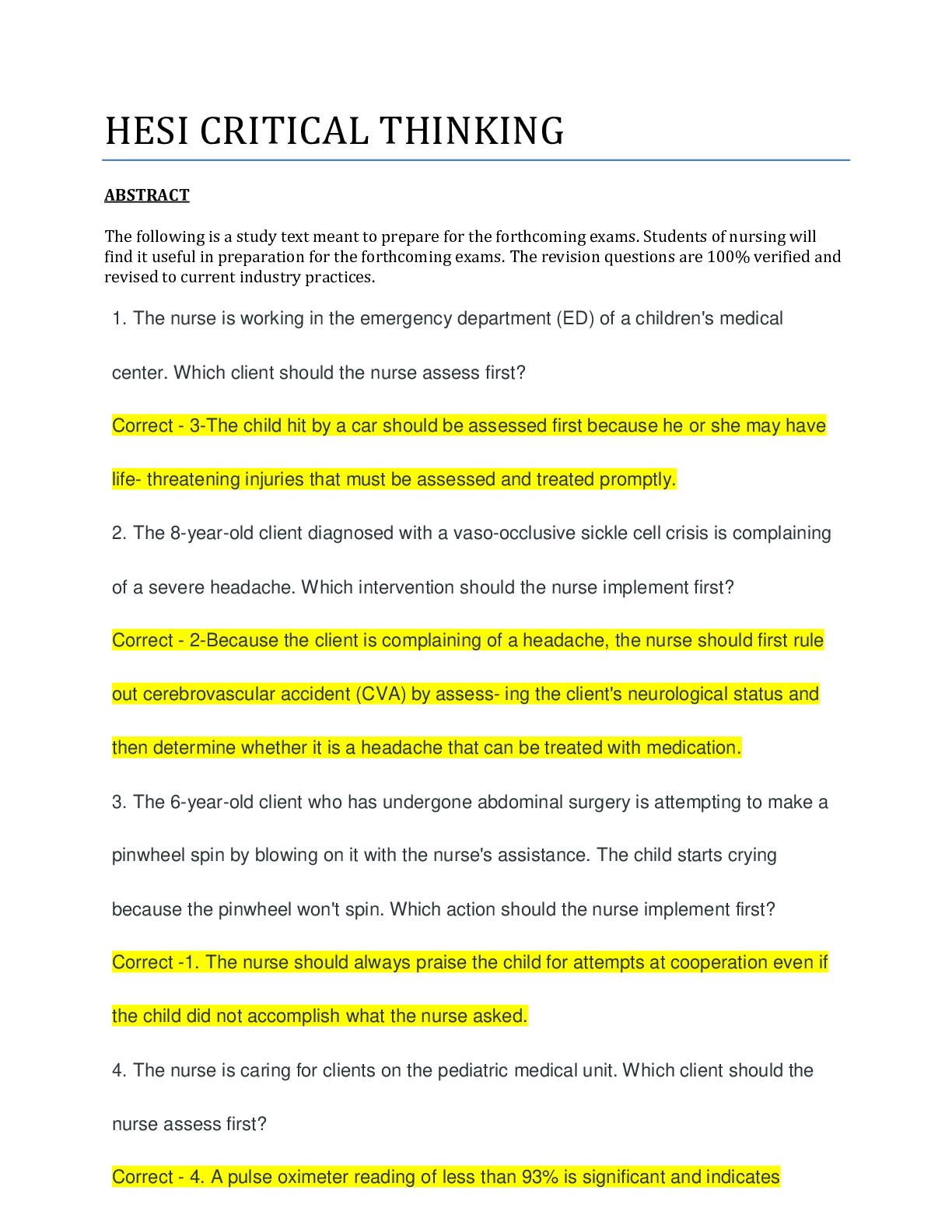
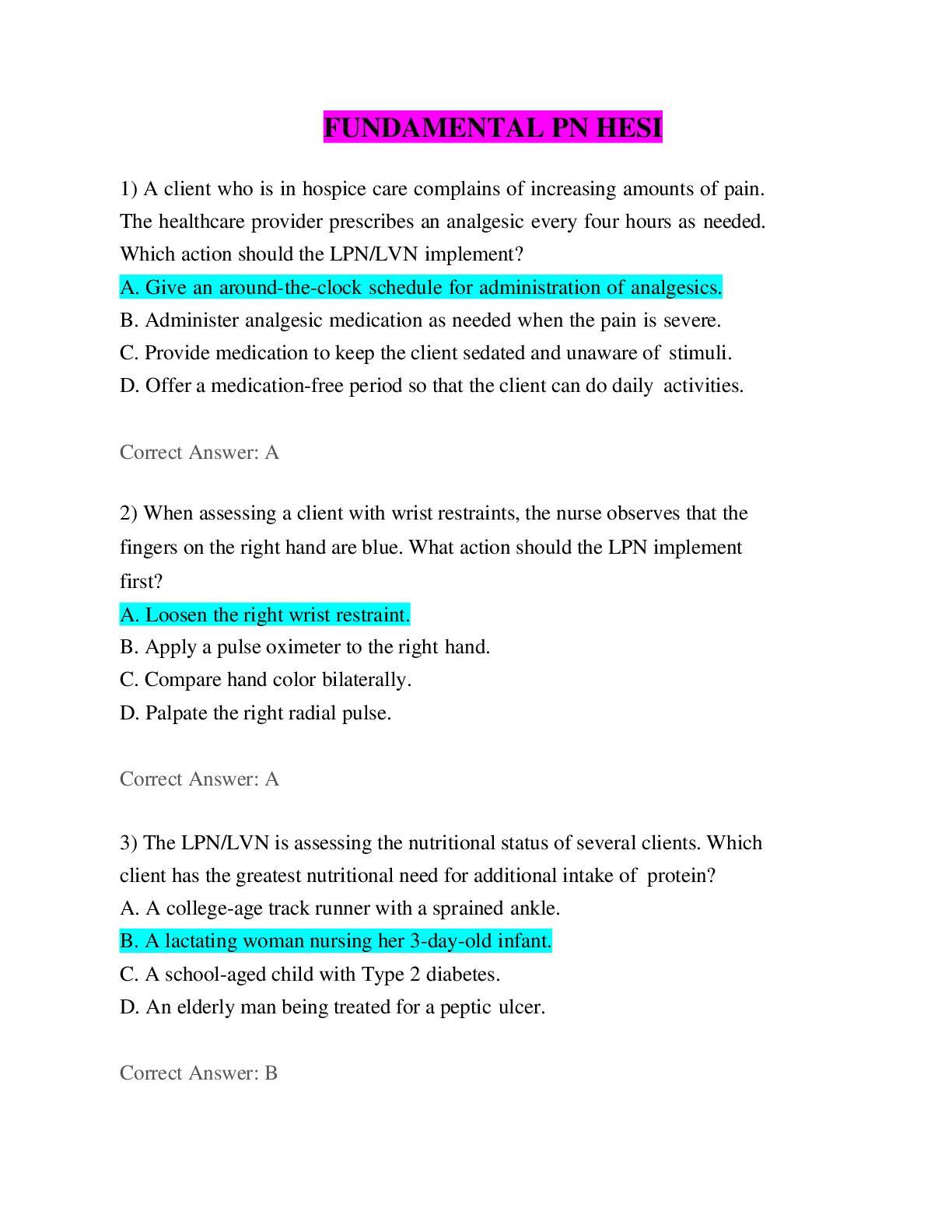
 V1 V2.png)
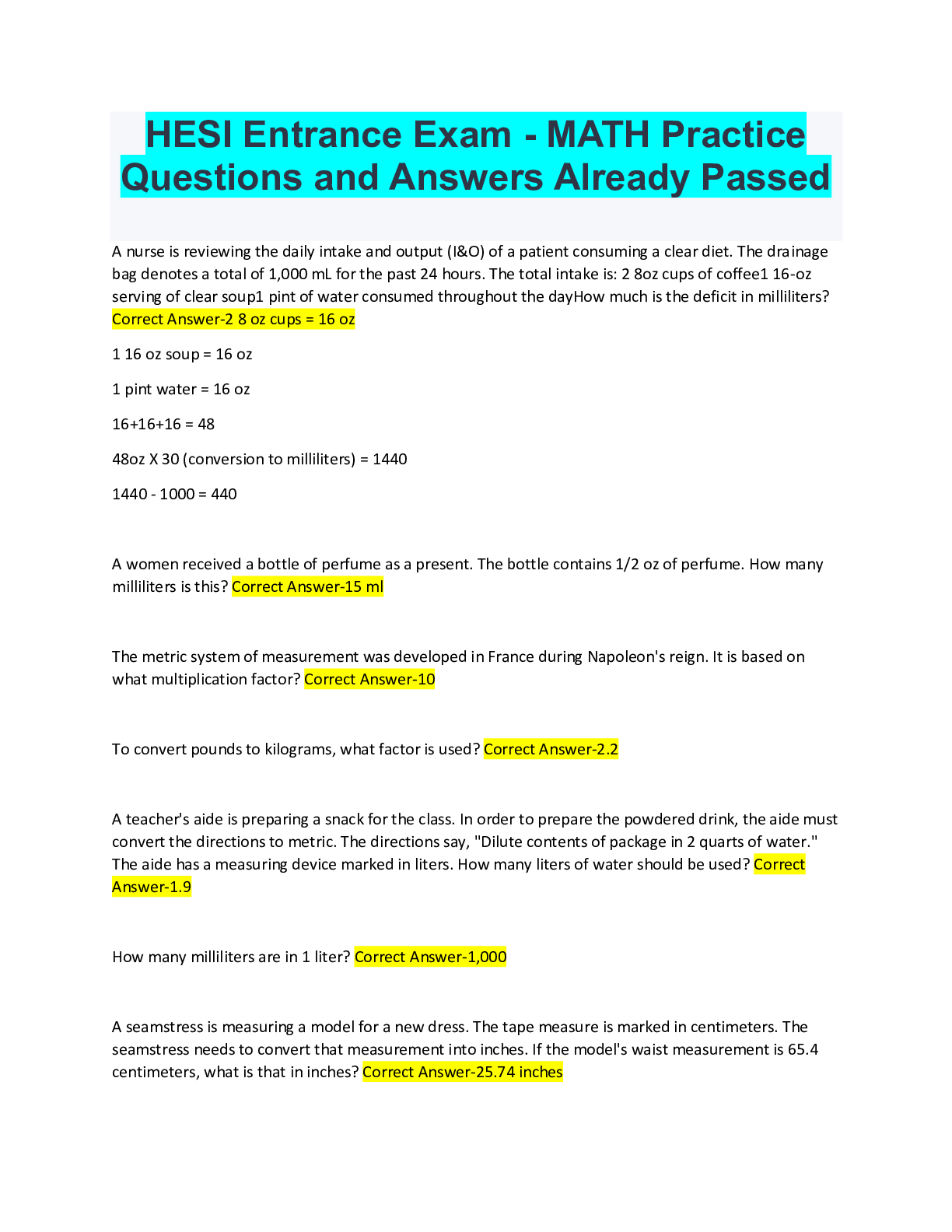
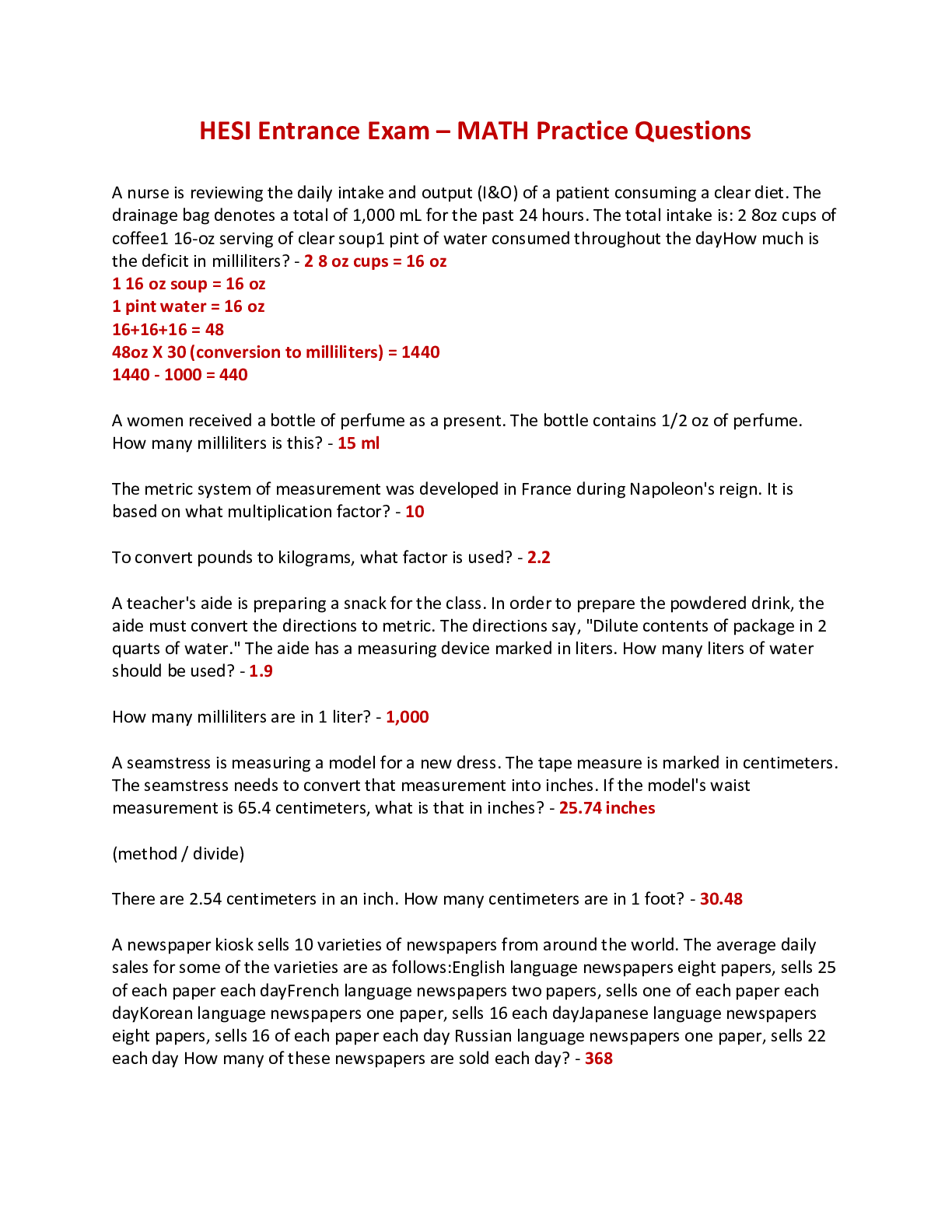
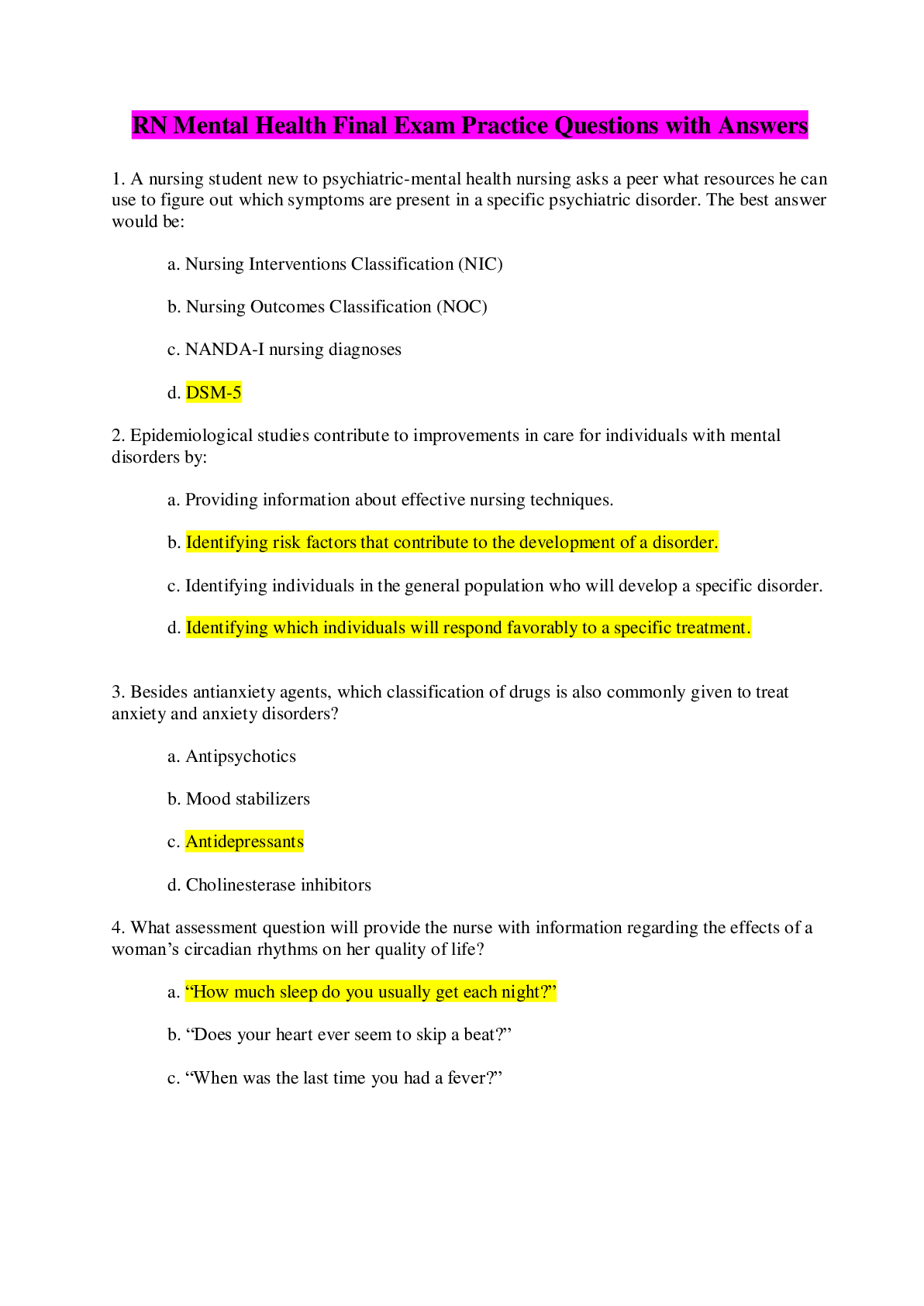
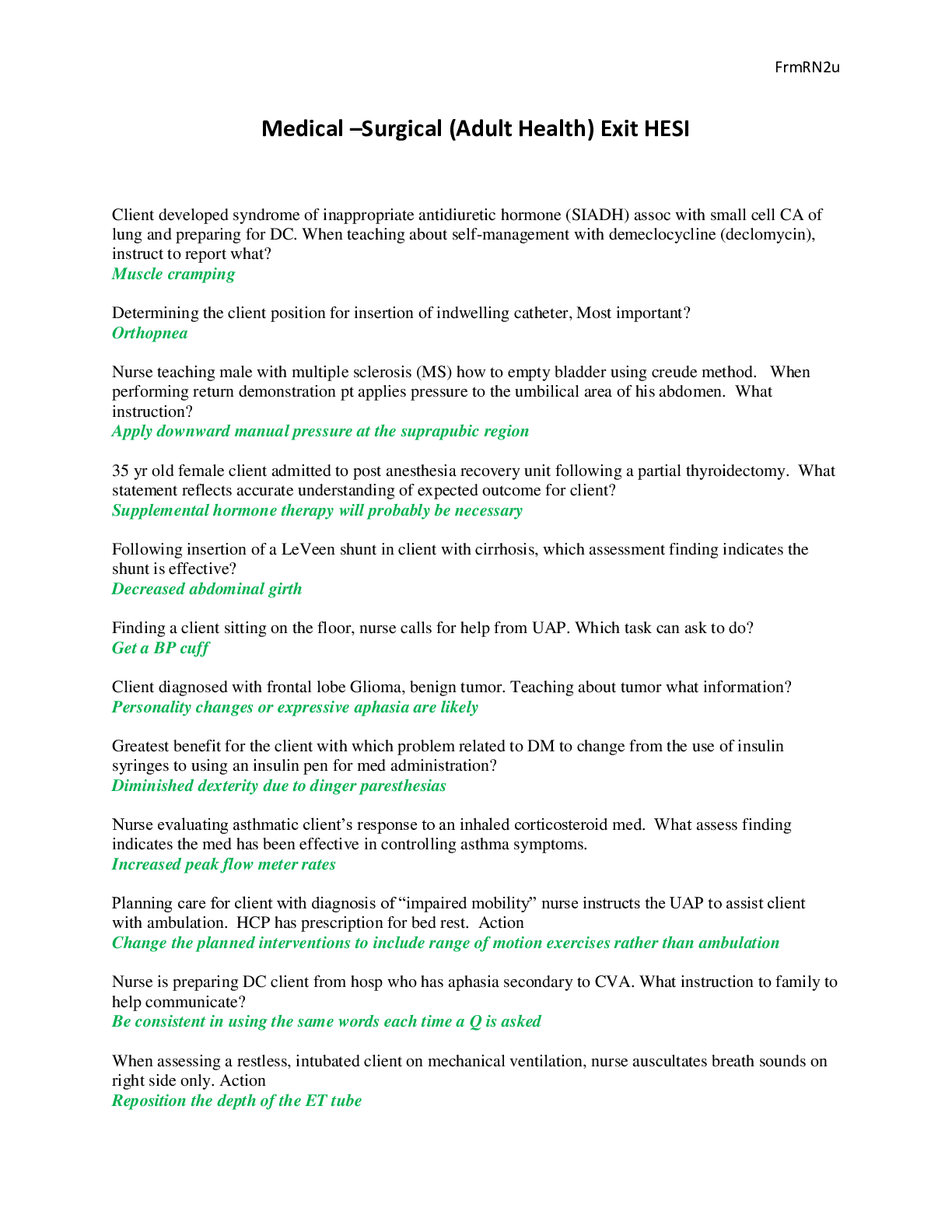
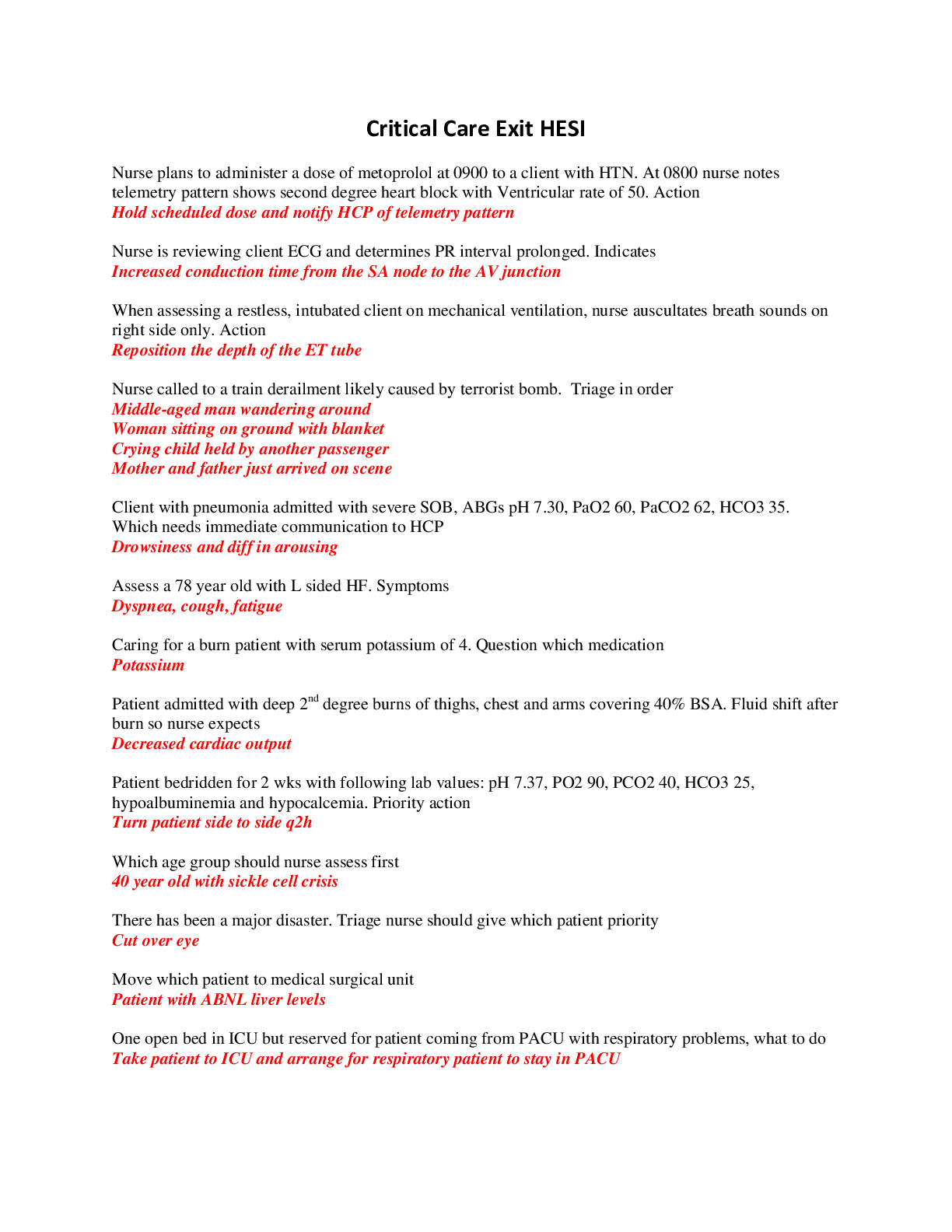
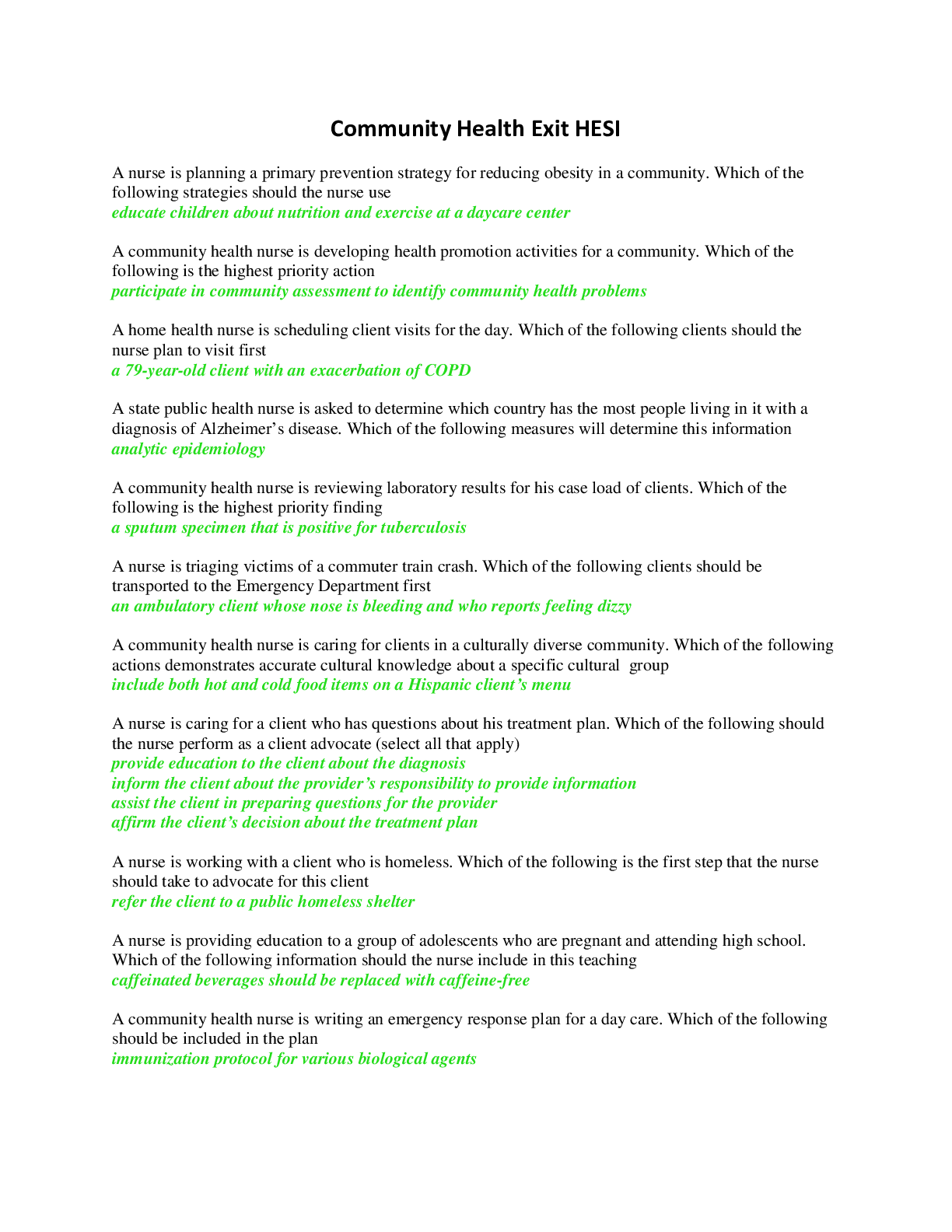
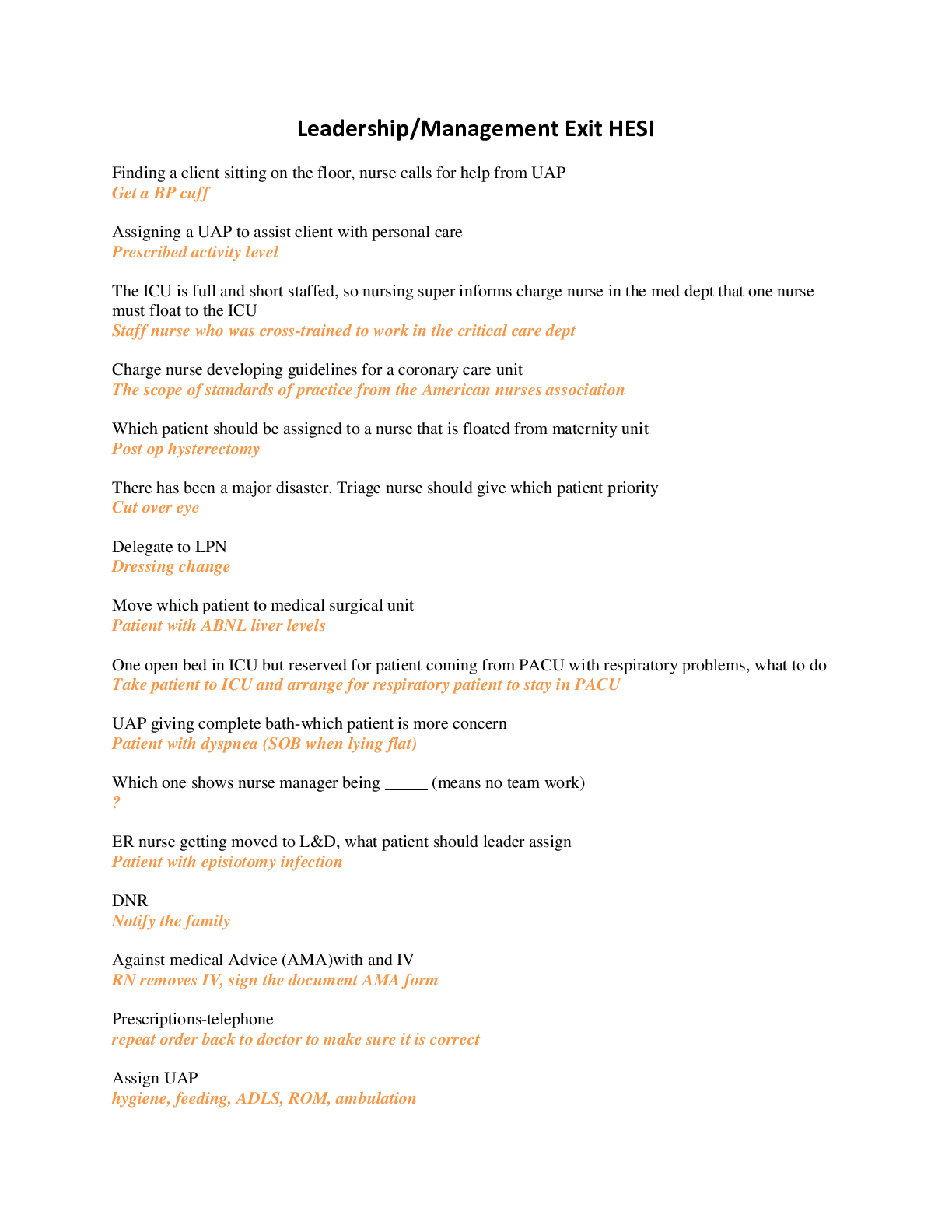
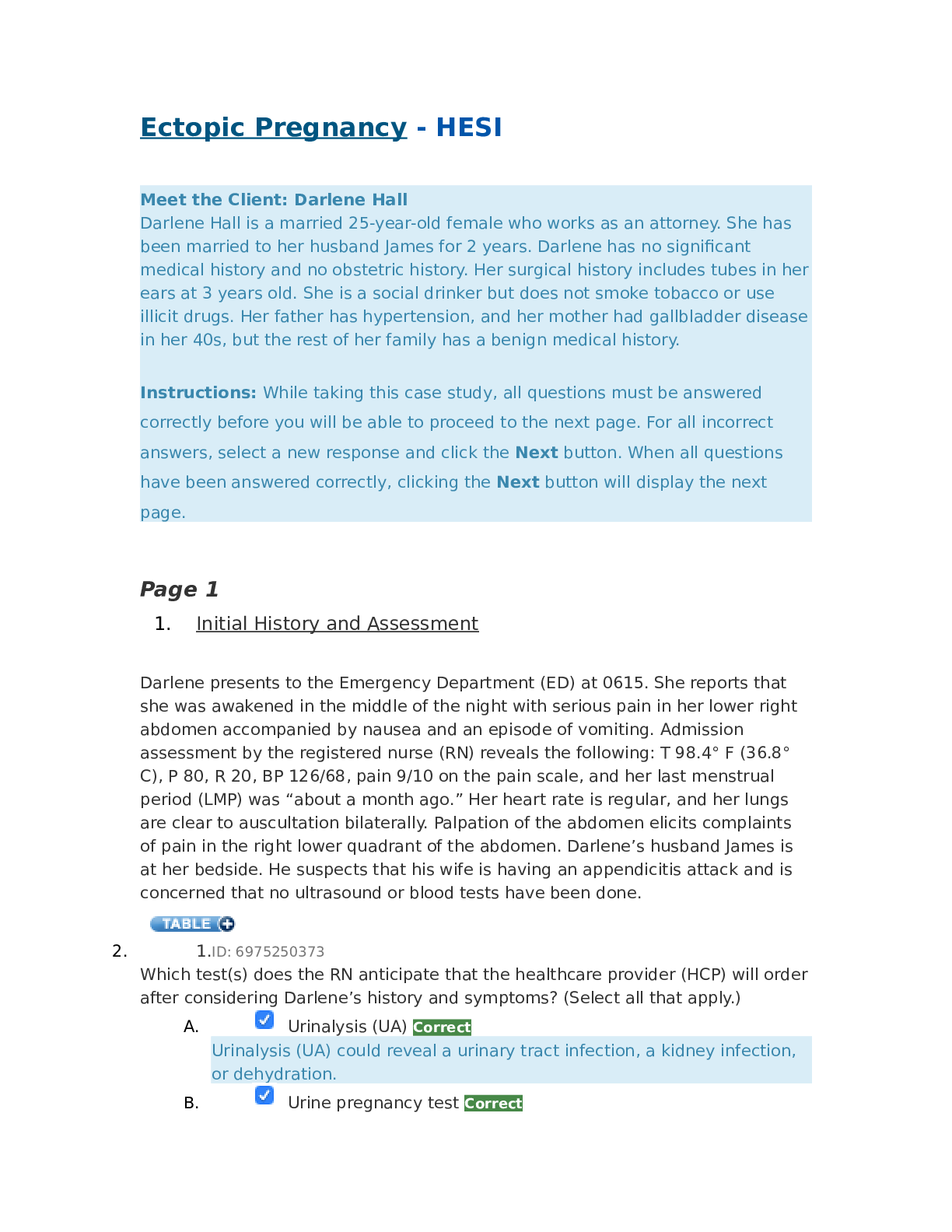
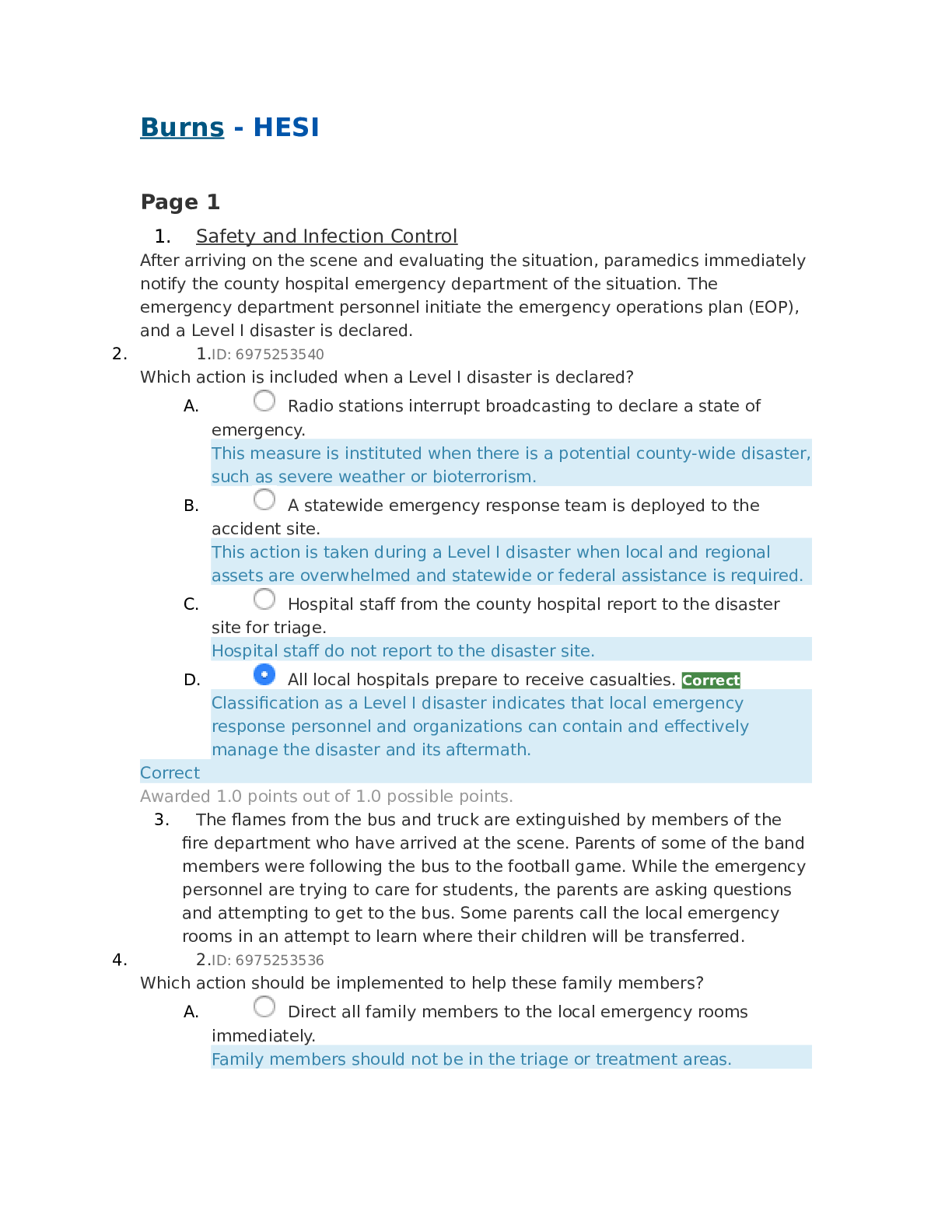
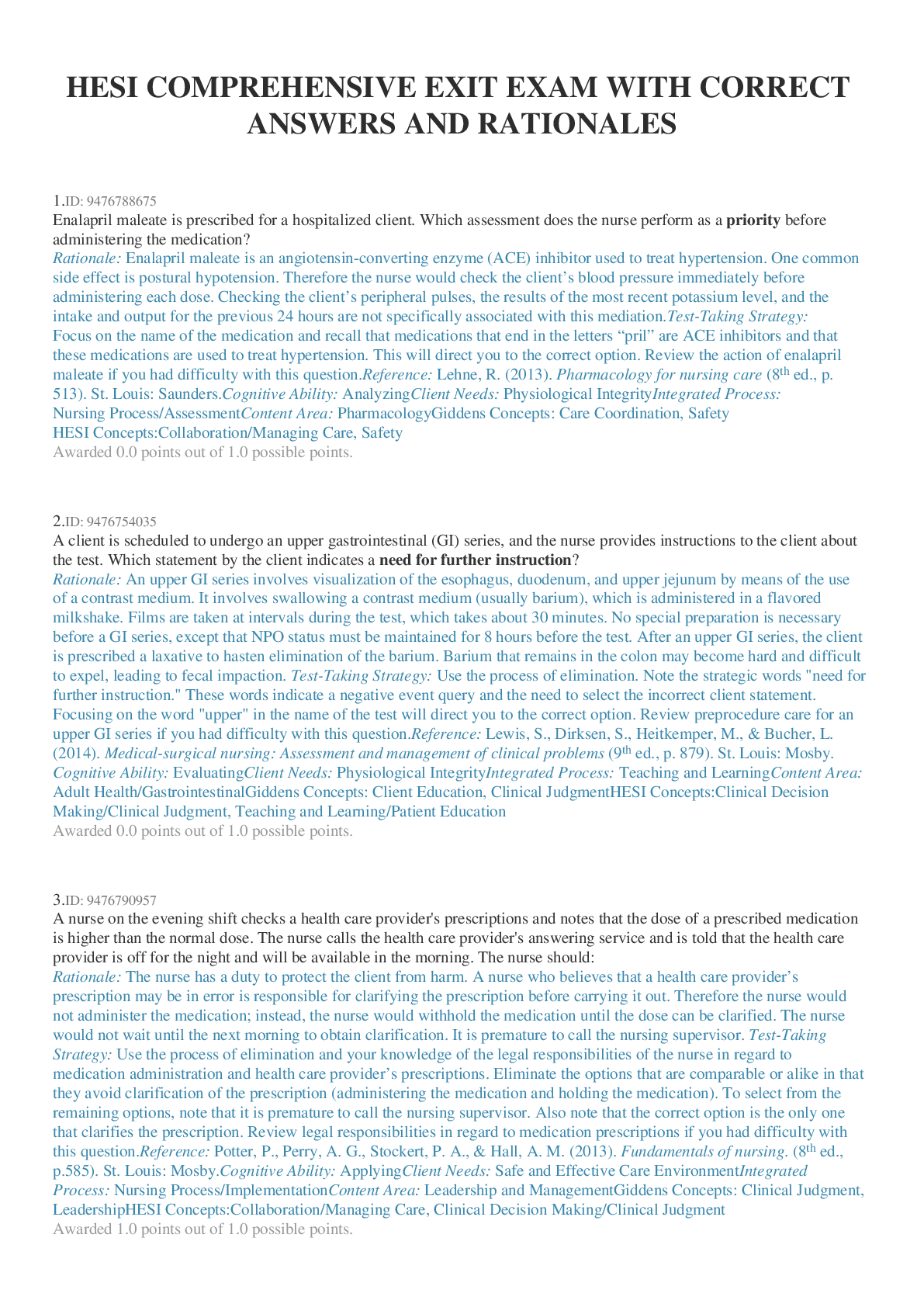
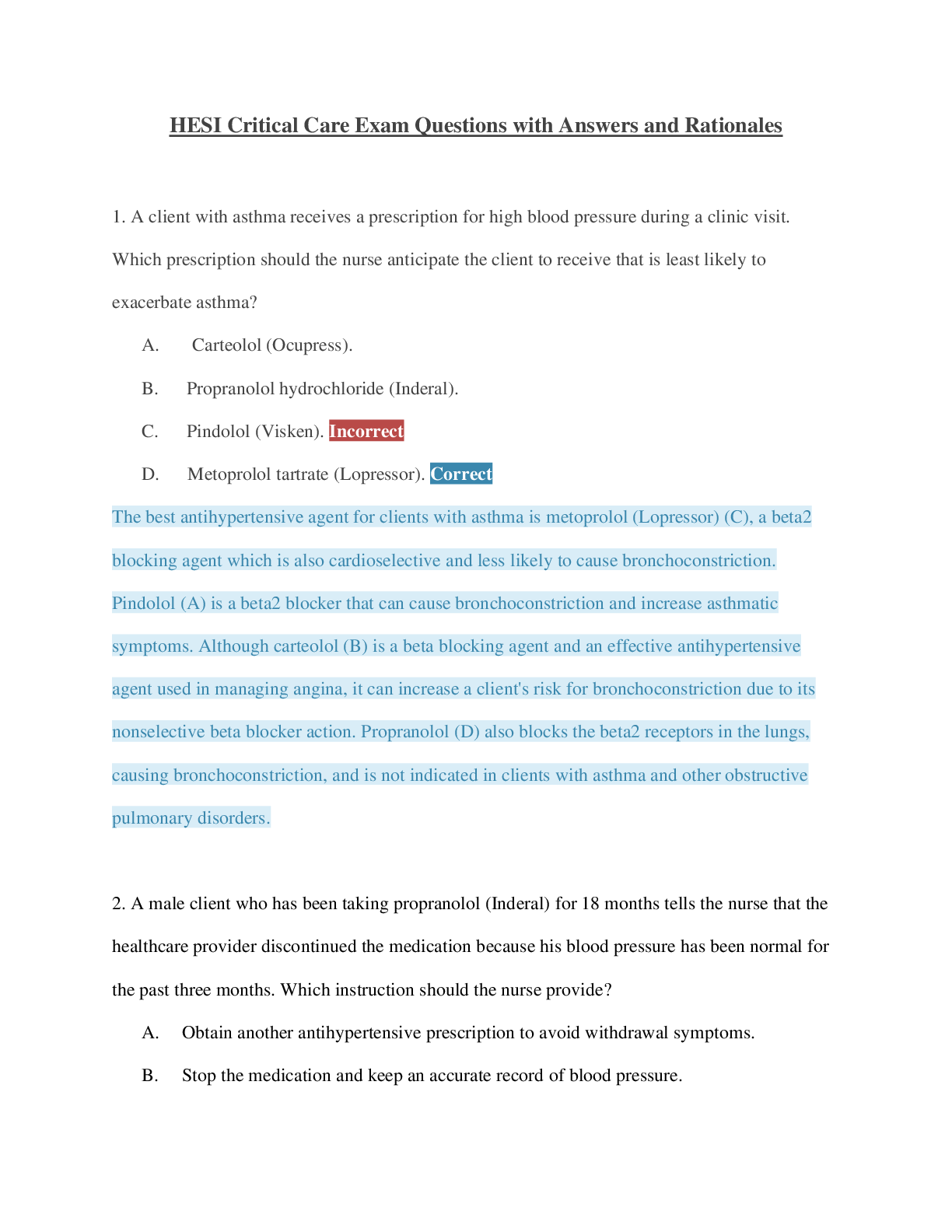
 - Copy.png)
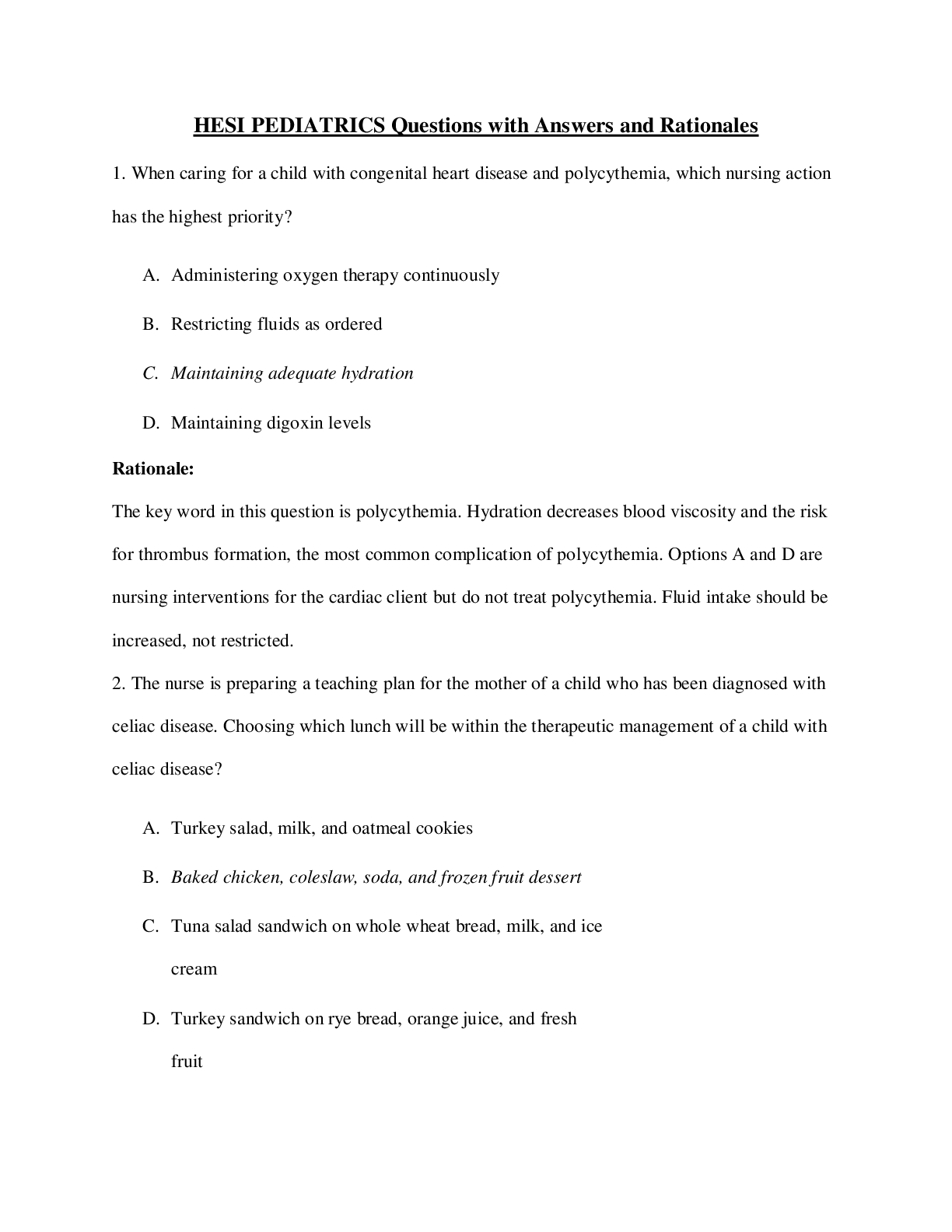
.png)
